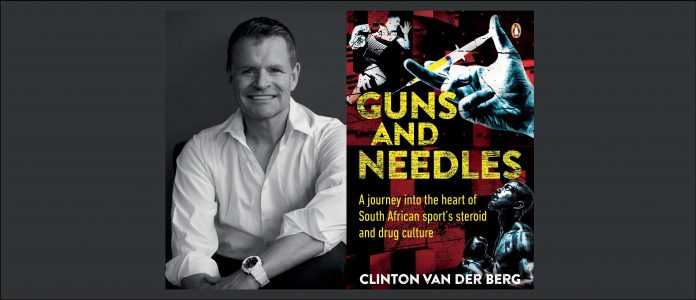SA sport enjoys an image of excellence and achievement, but beneath the surface lies an uneasy truth that tears at the heart of this notion. Clinton van der Berg, head of communication at SuperSport, tackles the subject in his book Guns and Needles.
Several weeks before I began writing Guns and Needles, I ran into Bruce Fordyce at the launch of his book. “The only good thing about this lockdown,” he grumbled, “is that everyone has a book inside us.”
It was the spur to get cracking, not least because South Africa’s greatest ultra-marathoner – and a superb raconteur – had laid down the challenge.
My obsession with sport meant that the drip-drip news of steroids and drugs in sport had been near constant for 30 years. The stories floated in and out of the news cycle on an almost monthly basis. As a newspaperman, I often wrote them. What was remarkable was that the cases took in all sport and cut across all demographics. No sport was a no-go, even with the warnings, the dangers of being tested and the inevitable social shame.
I was drawn to these episodes for several reasons, chiefly because of the characters involved. Many were world-class athletes – but they had feet of clay. Each story was different, remarkable in its own way and utterly beguiling. The more I dug around, the more I realised that there was a compelling narrative that took in varying elements: shame, competition, ego, naiveté, arrogance.
I threw myself into the project because there was so much information to sift through, so many stories to consider. Such a book demanded to be written.
Guns and Needles does more than merely document South Africa’s extraordinary trajectory of cheating and doping; it sounds a warning to young participants, and indeed their parents, of the dangers of opting for the needle or tablet for an extra boost. It’s never worth it, even for the momentary high or the gold medal.
There is no doubt that doping has a sexy appeal. You can get big and buff and push yourself to extraordinary levels, but few who do so ever get away with it. There is an endless game of cat and mouse that is played between the doping chiefs and the cheats. No doubt some dopers get away from time to time, but the hammer often comes down hard on those whose bad habits are uncovered. Their bodies litter the sporting landscape.
I discovered an interesting parallel between athletes’ behaviour and indeed the zeitgeist of the country. The growing indifference to laws and regulations, which spiked during the pandemic, gave rise to similar sentiments within sport. An anything-goes culture has developed, which may explain the ubiquitous status of steroids in gyms and elsewhere. When someone pops for steroids, few are really surprised. The embarrassment passes quickly.
We live in a country where sport is held up as a symbol of hope and unity. It truly does bring South Africans together, but the warmth and bonhomie of sport in popular culture is also a mirage.
The book is essentially a mirror of South African society, poking beneath its ugly underbelly and revealing the parts we don’t particularly enjoy seeing, or pretend don’t exist.

Credits: The Penguin Post, a magazine about books for book lovers from Penguin Random House South Africa. Details: penguinrandomhouse.co.za/penguin-post-latest-issue






